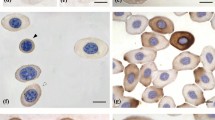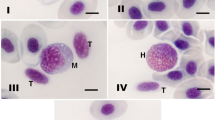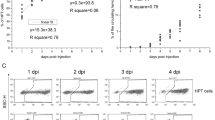Abstract
BUDDING of erythrocytes giving rise to non-nucleated erythroplastids in the peripheral blood was observed by Emmel1 in ten out of eleven species of urodeles. One species, Batrachoseps attenuatus, has approximately 95 per cent non-nucleated erythrocytes1,2. Budding in the Anura is less well substantiated. Jordan and Spiedel3 described stages in the extrusion of the nucleus of erythrocytes of the bullfrog, Rana catesbiana.
This is a preview of subscription content, access via your institution
Access options
Subscribe to this journal
Receive 51 print issues and online access
$199.00 per year
only $3.90 per issue
Buy this article
- Purchase on Springer Link
- Instant access to full article PDF
Prices may be subject to local taxes which are calculated during checkout
Similar content being viewed by others
References
Emmel, V. E., Amer. J. Anat., 33, 347 (1924).
Duran-Jorda, F., Acta med. Scand., 40, 183 (1951).
Jordan, H. E., and Spiedel, C. C., Amer. J. Anat., 32, 155 (1923).
Dawson, A. B., Amer. J. Anat., 42, 139 (1928).
Author information
Authors and Affiliations
Rights and permissions
About this article
Cite this article
JACOBSON, M. Budding of Erythrocytes in the South African Clawed Toad (Xenopus laevis) after Splenectomy. Nature 172, 1107–1108 (1953). https://doi.org/10.1038/1721107a0
Issue Date:
DOI: https://doi.org/10.1038/1721107a0
This article is cited by
-
On the transformation of erythrocytes in the peripheral blood of the frog
Bulletin of Experimental Biology and Medicine (1966)
Comments
By submitting a comment you agree to abide by our Terms and Community Guidelines. If you find something abusive or that does not comply with our terms or guidelines please flag it as inappropriate.



